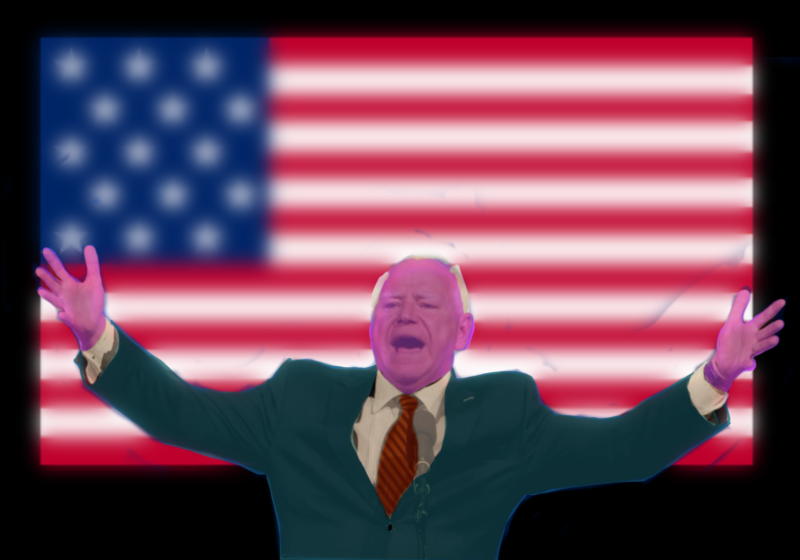The Vice Presidency of the United States is a curious office. Almost always completely impotent, yet it’s one heart attack or Secret Service screw up away from making history. It’s been a banner year for veeps; Kamala Harris has quickly assumed the mantle of the Democratic party after Biden was finally forced out, J.D. Vance has made history by likely being the least popular running mate of all time, and Tim Walz has arisen from relative obscurity to become the most liked candidate in the race.
Harris’s selection of Tim Walz came as a surprise to many who saw popular PA Gov. Josh Shapiro (’95) as a shoo-in for the role. There are many reasons Shapiro may have been passed over, from his virulently racist Campus Times op-ed, to his role in the controversial death of Ellen Greenberg, to the fact that he simply may have appeared too ambitious to be content as Harris’s sideshow. What probably was not a main factor in Harris’s calculations is that Tim Walz is exactly the type of politician that Democrats need to represent them. In her quest to find someone that would help deliver the midwest and balance the ticket, Harris has picked the man who could reinvent the Democratic party if given the chance.
Since the mid-20th century the Democratic party has increasingly focused on a neoliberal policy agenda, seeing the private sector as the most important, leaving the government to facilitate global trade and free markets while scaling down welfare spending. This approach led to the boom (and eventual bust) of the Clinton administration, and the gutting of welfare programs of all kinds in 1996. Broadly, Democrats conceded to Republican ideals which had great political purchase only a half century prior, that the government is the best vehicle to improve the lives of citizens. In the aftermath of the Clinton years, the American public saw ambitious policy ideas like single-payer healthcare watered down into market-based approaches like Obamacare, and public schools supplanted by private “charter schools” that sap their funding. The problem is that these ideas don’t work, at least not for that long. The GDP may continue to grow, but the quality of life for all but the richest Americans continues to decline as corporations control more and more of everyday life.
Of course, Tim Walz has made no pronouncements about neoliberalism — few politicians have. But his record shows that his brand of politics is a real departure from this 50-year trend. In his time in congress, Walz opposed the bailouts of the banking and auto industries and supported stricter financial industry regulations. He also opposed a number of free trade agreements citing concerns over human rights and their impact on American workers. As a former unionized public school teacher, Walz has been great to both of these key democratic constituencies. He walked picket lines; banned “non-compete” agreements, which hindered workers’ ability to find new jobs in the same industry; and banned employers from holding captive audience anti-union meetings. Walz also boosted public education funding by $2.2 billion and opposed charter schools, privately-run institutions that undermine the universalist goals of publicly funded education. This is a break from figures like Barack Obama and Josh Shapiro who have strongly supported charters and Senator Mark Kelly who has failed to stand by organized labor.
The most evocative achievement of Walz’s gubernatorial career, however, is the passage of universal free school lunches and the child tax credit in Minnesota. Unlike neoliberal welfare programs, these policies do not “means-test,” meaning there are no complicated hoops to jump through, and all citizens of Minnesota can expect those benefits as a public good. The Covid-era national child tax credit reduced child poverty by as much as 30%, and by implementing a state level version when the other expired, Walz and his allies have dealt a big blow to child poverty. When pressed on the politics of feeding all kids rather than only the ones deemed poor, Walz retorted, “This just makes sense. This is the assurance that no one falls through the cracks because a busy parent didn’t fill out a form.” News coverage of the signing centers a beaming Walz flanked by numerous happy kids.
This is the politics of joy. It’s a return to being defiant about what we will not accept in one of the richest countries on Earth. America’s political moment begs for something more than the usual means-tested half measures and equivocation; it asks for ambitious, universal government actions and the confidence to defend them. A friendly midwesterner might be the best guy to show Democrats that vision.






